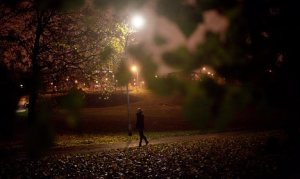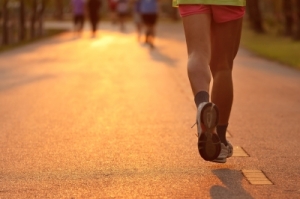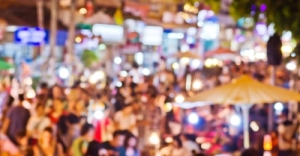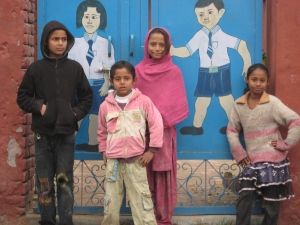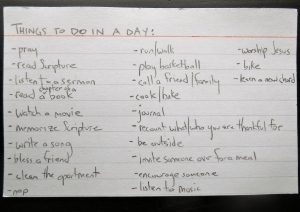I started walking at night while I was still sick. I had just returned home from India, battered and broken and relatively lifeless, and had little else to do but walk. Actually, at first anyway, I could do little else. I suppose I could have walked during the day but I never wanted to. I didn’t want to go outside during the day. I spent my days sleeping and staring and writing and playing guitar and crying. But for some reason, when night came small specks of life began to stir in me. I recognized it immediately because I hadn’t felt it in awhile – life, that is. And these specks of life eventually lured me outside into the night air.
Perhaps it was because I hadn’t been able to walk alone in India at night and so walking alone in Canada at night felt special. Perhaps it was because I was depressed and my doctor told me I needed to get exercise if I was going to get better. Or perhaps it was because I heard the voice of God call to me from the thick darkness.
Whatever the case, I began to walk up and down the streets of my neighbourhood, night after night. I established a route. As I walked I looked at the tall trees lining the streets and often stopped to gently run my hand over the bark. It was good to feel something outside of me. I looked at houses and wondered about who lived in them and I observed what kinds of cars people had parked out front. I discovered a retirement home just around the corner from my apartment, and church buildings, and back alleys, and school yards, and homes with lights on and homes with no lights on. I heard people talking through windows, and practicing piano, and yelling at each other. I saw the flicker of late night television through curtain-drawn windows. You know, the kind of simple discoveries you make when you take notice of your surroundings. And when you don’t want to notice anything else.
I would go walking as late as possible. I didn’t want to see anyone and I didn’t want anyone to see me. For the most part, my timing was perfect. I had the place to myself, darkness acting as my comforting sweater and solitude as my map leading me to nowhere in particular. I could hear crickets chirping and rain dripping and the breeze rustling the leaves of the trees and…
I could hear my heart, its pieces rattling around inside – broken, confused, lost, aching.
There was something about walking at night that felt very familiar to me and for many months it was the only time I felt a measure of home and peace. The day held people and conversations and so-called answers and expectations and “light.” People could see me. I could see me. But at night? It was just me at night, no one was watching; I wasn’t watching. The minute I stepped outside and filled my lungs with the humid night air – I could breathe! And these breathes, one at a time, rising and falling, started to fill me with life once again.
It was as if the darkness wasn’t dark at all. It was as if these night walks of mine were the only time I could really see light. Because, finally, I had nothing to prove to anyone or to myself or to God. It was just me. And Him.
I started talking with God. My words mixed with my tears and my tears with my words. Those were messy conversations and the most real conversations I’ve ever had.
I especially loved when it rained while I walked at night because I felt even more safe in the rain. Sometimes I couldn’t tell where the rain stopped and my tears began. We were one – the sky and I, crying together, creation groaning together, begging God to fix things once and for all. In the earth and in its people and in me. We didn’t know it at the time (well, I can’t speak for the sky) but we cried because we knew there was still something, somewhere, worth crying for. It was our act of worship.
Eventually words came, one by one, and then sentences and paragraphs followed. Whispers and yells and passionate pleas and singing. If anyone saw me, surely they thought I was crazy. Maybe I was. A crazy woman, yelling at the sky at 11:30 at night, stumbling down the sidewalk in blind grief. I even laughed on occasion and I’m sure that was the icing on the cake!
But sometimes my words sounded more like gasps – those seconds and minutes when you are filled with so much anguish that you can’t breathe properly. So I would stop talking and just keep walking.
In those moments, my steps became my words, persistent messages to God that I would keep going, that I would not give up, that I believed that I would once again walk in the land of the living. After all that had happened, why did I keep believing this? I still don’t really know except to say that faith is a baffling masterpiece and only ever a gift.
Something remarkable happened on those night walks. I got honest. I mean, really honest. I said things to God that I never said before. I asked questions that I never asked before. Nothing was stopping me now. Besides, what did I have to lose? I was empty – empty enough that there was finally nothing between my heart and me. I saw it for what it was – the redeemed and the yet-to-be redeemed. And I laid it before Jesus, night after night, layer after layer, and we talked about it.
We talked about how broken I was. I didn’t just “confess” or “repent”. No, we were far beyond that now (as necessary as these are as a starting place). This wasn’t church or religion or a to-do list or false-guilt or moral obligation or… this was ME! Me, this little broken human being, standing before my Creator under the night sky, asking for a way out of death. I already knew what Jesus did for me, but this wasn’t about believing something in my head that happened centuries ago, as real and relevant as it was and still is. This was about today, and today was dark, today was broken, today had lost all hope.
JESUS, WHAT ARE YOU GOING TO DO ABOUT TODAY?
Maybe that’s part of the difference between believing something and following Someone.
God started showing me things – difficult things, beautiful things. He began mining the depths of my heart, gently digging up memories and hurts, unhealthy thought-patterns and crooked beliefs – He show me things I had not seen before and things I had covered up long ago. Where was He going with all of this? And why? How deep can He go until He digs right through to the other side? It was painful. I didn’t recognize who I was any longer. And yet, night after night, I went back for more. Walking, talking, crying… something was happening inside of me. Life was happening! This slow chipping away of my heart was uncovering something invaluable – new soil.
And then, just like that, it was done. I don’t know when exactly, and I can’t say how exactly, but the overhaul was done and He started planting seeds. And He’s been planting seeds ever since.
I still take night walks. I’m in a different season of life now, but, then again, I suppose its not really all that different. I still need to pace the streets in the night air, I still need to talk with Jesus about my brokenness and the brokenness around me, I still need Him to see me as I am and change me, and I still need to worship God with my tears. But now when we walk we also talk about other things – hopes, dreams, and people and situations. Walking at night has become one of my favourite things to do. It’s the time of my day or week when I feel most alive, most like myself, most connected to my Creator, most like God is right there at my side, in my backyard and on my streets – it’s as if I was made to walk and talk with God.
I was. We are.
I guess once you see your heart, forged in the fire of God, you don’t want to look away; you don’t want to go back to how it used to be. Because, what you are actually seeing is a miracle in the making. Stone turning into flesh, the old being made new, the broken being put back together again, and a Redeemer who walks with you every step of the way. Even at night.
Especially at night.
“I will give you the treasures of darkness, riches stored in secret places, so that you may know that I am the LORD, the God of Israel, who summons you by name” (Isaiah 45:3).
(P.S. Don’t worry, Mom. I live in a safe neighbourhood!)
(P.P.S. Awhile after I started walking at night, I started running during the day. You can read about that here if you want.)
________________
© Stephanie Ratcliff and stephanieratcliff.com, 2014. Unauthorized use and/or duplication of this material without express and written permission from this blog’s author and/or owner is strictly prohibited. Excerpts and links may be used, provided that full and clear credit is given to Stephanie Ratcliff and stephanieratcliff.com with appropriate and specific direction to the original content. Stephanie Ratcliff can’t remember where she got the photo from, but definitely somewhere on the internet. She apologizes to the Photographer. If you took it, let her know, and she’ll definitely give you props. Thanks!

